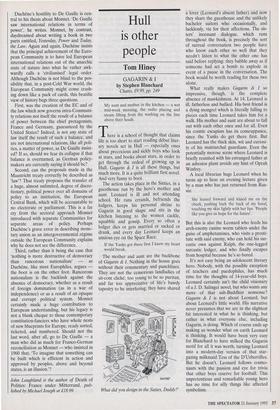Hull is other people
Tom Hiney
GAGARIN & I by Stephen Blanchard Chatto, £9.99, pp. 249
My aunt and mother in the kitchen — a wet mid-week morning, the radio playing and steam lifting from the washing on the line above their heads.
There is a school of thought that claims life is too short to start reading debut liter- ary novels set in Hull — especially ones about precocious and sickly boys who look at stars, and books about stars, in order to get through the ordeal of growing up in Hull. Gagarin & I is all these things, but much more. It is a quite brilliant first novel. And very funny to boot.
The action takes place in the Sixties, in a guesthouse run by the hero's mother and aunt. Leonard is ill and not attending school. He runs errands, befriends the lodgers, keeps his personal shrine to Gagarin in good shape and sits in the kitchen listening to the women cackle, squabble and gossip. Every so often a lodger dies or gets married or sacked or drunk, and every day Leonard keeps an anxious eye on the Space Race:
If the Yanks got there first I knew my heart would break.
The mother and aunt are the backbone of Gagarin & I. Nothing in the house goes without their commentary and punchlines. They are not the censorious landladies of sit-com cliche; too young to be so puritan, and far too appreciative of life's bawdy tapestry to be interfering, they have shared What did you design in the Sixties, Daddy?' a lover (Leonard's absent father) and now they share the guesthouse and the unlikely bachelor suitors who occasionally, and lucklessly, vie for their affections. The sis- ters' incessant dialogue, which runs throughout the book, is precisely the sort of surreal conversation two people have who know each other so well that they needn't listen to what the other one has said before replying: they babble away as if someone had set a bomb to explode in event of a pause in the conversation. The book would be worth reading for these two alone.
What really makes Gagarin & I so impressive, though, is the complete absence of mawkishness. At 14, Leonard is ill, fatherless and bullied. His best friend is a dying mongrel which is literally falling to pieces each time Leonard takes him for a walk. His mother and aunt are about to fall out with each other once and for all. Even his cosmic escapism has its comeuppance, since the Yanks do get there first. But Leonard has the thick skin, wit and curiosi- ty of his matriarchal guardians. Even the potentially morose scene where Leonard is briefly reunited with his estranged father at an asbestos plant avoids any hint of Oprah Winfrey.
A local librarian hugs Leonard when he turns up to hear an evening lecture given by a man who has just returned from Rus- sia:
She leaned forward and kissed me on the cheek, pushing back the back of my hood, touching my skin lightly with her lips. 'People like you give us hope for the future'.
But this is also the Leonard who feeds his arch-enemy canine worm tablets under the guise of amphetamines, who visits a prosti- tute with said enemy, who can hold his sar- castic own against Ralph, the one-legged sarcastic lodger, and who finally escapes from hospital because he's so bored.
It's not easy being an adolescent literary hero. Nobody, with the possible exception of teachers and paedophiles, has much time for the thoughts of 14-year-old boys. Leonard certainly isn't the child visionary of a J. D. Salinger novel, but who wants any more of that sub-Buddhist nonsense? Gagarin & I is not about Leonard, but about Leonard's little world. His narrative never presumes that we are in the slightest bit interested in what he is thinking, but rather in what everyone else, including Gagarin, is doing. Which of course ends up making us wonder what on earth Leonard is thinking. It would have been very easy for Blanchard to have milked the Gagarin motif for all it was worth, turning Leonard into a modern-day version of that star- gazing milkmaid Tess of the D'Urbervilles. But he doesn't. Leonard follows cosmo- nauts with the passion and eye for trivia that other boys reserve for football. This unpretentious and remarkable young hero has no time for silly things like affected symbolism.


























































 Previous page
Previous page